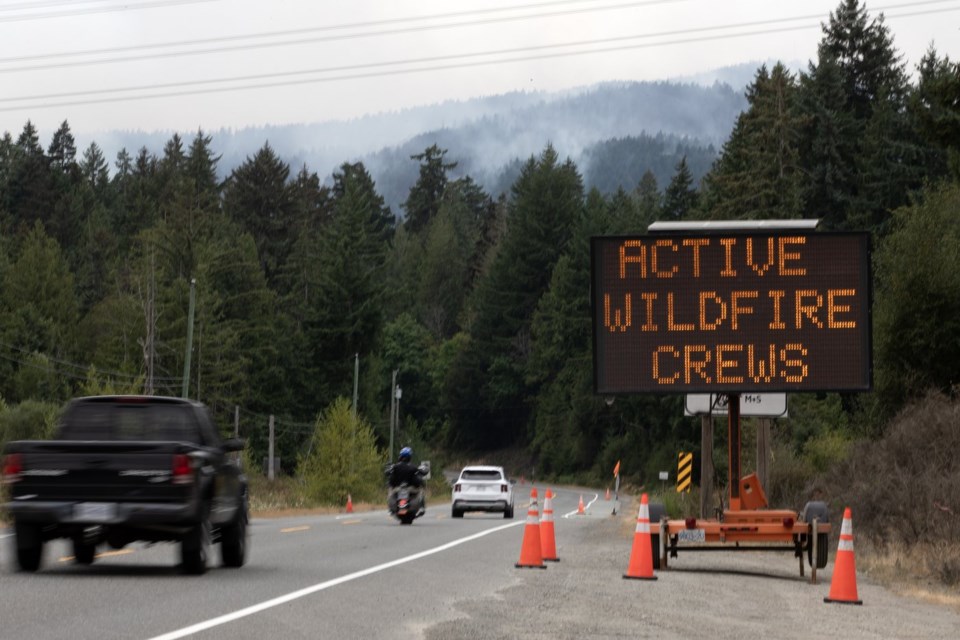Vancouver Island photographer Colby Rex O'Neill has had restless nights as a wildfire burns less than a kilometre from his home.
That's a worry, but he also fears the Wesley Ridge fire could reach what he called a "national treasure" — Cathedral Grove, a temperate rainforest with trees that are about 800 years old, located in a park on central Vancouver Island.
Rex O'Neill said he was closely watching the fire burning east of MacMillan Provincial Park, which contains what he described as "one of the most beautiful forests in the world."
"I feel like, if it ever really was being threatened, that we would need to do something as a country to protect it. That forest is a very special place," he said.
Madison Dahl, a fire information officer with the BC Wildfire Service, said the renowned grove was not threatened by the blaze on Tuesday.
There had been minimal growth overnight as helicopters equipped with night-vision technology worked to dump water on hot spots, Dahl told a media briefing.
Still, the Regional District of Nanaimo maintained an evacuation order covering nearly 390 homes on the north side of Cameron Lake and Highway 4, where Dahl said crews had established structure protection for homes and critical infrastructure.
Rex O'Neill said he takes visiting friends and family to see the beauty of Cathedral Grove, about a 10-minute drive from his home, which was subject to an evacuation alert.
He said the wildfire was intense when it started last week, producing ashes that sprinkled over the hood of his car.
"It was big and it was fast and it was powerful. You could hear the trees exploding, basically collapsing, falling into the lake," he said, adding it felt like a "weird nightmare dream."
The blaze is one of dozens sparked during a stretch of hot, dry weather last week.
The number of fires burning across British Columbia more than doubled as the heat coincided with thunderstorms that produced tens of thousands of lightning strikes.
There were more than 130 active fires on Tuesday, up from about 60 a week ago.
However, an update from the BC Wildfire Service said cooler temperatures and scattered showers were expected across much of the province over the next two days, with lingering thunderstorms in eastern parts of the southern Interior.
The downturn appears to have helped crews battling the Cantilever Bar wildfire burning on the west side of the Fraser River about 10 kilometres south of Lytton.
The wildfire service changed the classification of the 14-square-kilometre blaze from burning out of control to "being held" later Tuesday.
The blaze had prompted an evacuation order issued by the Lytton First Nation as well as evacuation alerts from the Thompson Nicola Regional District and the Skuppah and Siska First Nations. The wildfire service website showed the order and alerts remained in effect after the classification change on Tuesday.
The Regional District of Central Okanagan, meanwhile, lifted an evacuation alert for 118 properties in the Peachland area, saying the nearby Drought Hill wildfire had been brought under control and the threat to life and safety had passed.
The bulletin from the wildfire service said a return to warmer and drier conditions was forecast for the end of the week.
"While the downturn in weather is assisting our response efforts, new lightning-caused wildfire starts are expected from the nearly 70,000 strikes received over the past week," the bulletin said.
Some areas, such as the north, western Cariboo and Kamloops, likely wouldn't see rain in the coming days, it added.
On Vancouver Island, Dahl said crews battling the Wesley Ridge fire were taking advantage of the cooler conditions.
There was no growth overnight at the northeast corner of the fire near homes in the area of Little Qualicum River Regional Park, she told Tuesday's briefing.
"Groundcrews and structure protection teams patrolled the wildland urban interface in these areas through the night, extinguishing hot spots," she said.
The fire was displaying mostly rank-one behaviour, meaning a "smouldering ground fire with no open flame," she said.
The northwest part of the blaze was displaying rank-two behaviour on Tuesday, referring to "a low, vigorous surface fire with some visible flame," she noted.
The Wesley Ridge fire is burning 60 kilometres northwest of Nanaimo and spans just over five square kilometres.
Highway 4 passes through MacMillan Provincial Park and the regional district has told people to avoid stopping in the area.
Douglas Holmes, emergency operations director for the regional district, said 509 evacuees had received emergency support services online or in person, and a reception centre was open in Qualicum Beach.
An additional 250 properties were subject to evacuation alert, meaning residents have been told to get ready to leave on short notice, he said.
More than 200 firefighters and seven helicopters were assigned to the blaze.
Holmes told Tuesday's briefing that people should stay off the water at Horn Lake and Spider Lake to leave room for firefighting aircraft to operate. Access to Cameron Lake had already been shut down, he said.
About 40 wildfires were classified as burning out of control across B.C. on Tuesday, with Environment Canada issuing a series of smoke-related air quality statements for parts of the Cariboo, Okanagan, Fraser Canyon, Prince George and South Thompson regions, along with parts of eastern Vancouver Island.
This report by The Canadian Press was first published Aug. 5, 2025.
Nono Shen and Brenna Owen, The Canadian Press




